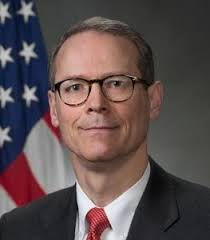Support for U.S. Intelligence Continues, Despite Presidential Attacks and Concerns Over Transparency
The Chicago Council on Global Affairs recently published the results from the third round of an annual poll, sponsored by the University of Texas at Austin’s Intelligence Studies Project, which aims to shed light on Americans’ perceptions of the intelligence community.

Published by The Lawfare Institute
in Cooperation With

The Chicago Council on Global Affairs recently published the results from the third round of an annual poll, sponsored by the University of Texas at Austin’s Intelligence Studies Project, which aims to shed light on Americans’ perceptions of the intelligence community. The data collected in 2019—including survey methodology and limited policy analysis—is available here. We discussed the survey’s baseline data from 2017 here, and the 2018 survey results here.
Data gathered in the third year of polling reaffirmed that most Americans believe U.S. intelligence agencies are necessary and make vital contributions to national security. This level of support did not appear to be affected by the intelligence community’s reduced public engagement over the past year or the continued public criticism of national security agencies by President Trump. However, the intelligence community still faces a challenge in persuading Americans that it respects their privacy and civil liberties. Perhaps unsurprisingly, few Americans understand the institutional framework for supervising and overseeing these powerful and secretive organizations.
Our key takeaways from the survey are as follows:
- A growing majority of Americans believe that U.S. intelligence agencies play a vital role in protecting the nation. Support for this view was strongest among older Americans, but the level of confidence increased in all age cohorts. There is no evidence that the president’s persistent attacks affected the public’s attitude toward U.S. intelligence. In fact, support for the intelligence community among Republicans polled increased over the three-year survey period.
- An overwhelming majority of Americans regard U.S. intelligence agencies as effective in accomplishing their assigned missions with eight in 10 crediting the intelligence community with preventing terrorist attacks and successfully uncovering the plans of our adversaries.
- Only half of respondents believed that the intelligence agencies effectively safeguard Americans’ privacy rights and civil liberties while pursuing their missions. This concern is widespread even among the intelligence community’s strongest and most knowledgeable supporters.
- The number of Americans who believe intelligence agencies should respect the privacy of foreign nationals to the same degree as U.S. citizens declined generally, but that sentiment remains popular with Democrats and younger respondents. Fewer than half of those surveyed believe they will be required to sacrifice personal freedoms to remain safe from terrorism.
- A strong majority of Americans believe the intelligence community could share more information with the public without compromising its effectiveness.
- Americans remain uncertain about which government officials or institutions are principally responsible for supervising and overseeing intelligence agencies.
Below, we provide excerpts from the report for interested readers.
... Impact of Transparency
The unlawful disclosure of sensitive and intrusive electronic surveillance programs by former National Security Agency (NSA) contractor Edward Snowden earlier this decade posed a threat to the [intelligence community’s (IC’s)] public standing and democratic legitimacy. Neither then-President Barack Obama nor key congressional leaders who were informed of the controversial programs acted forcefully to reassure Americans that the NSA had acted in a manner that was both effective in keeping them safe and respectful of their civil liberties.
Director of National Intelligence (DNI) James Clapper (2010-2017) responded to this crisis in public confidence by launching a “Transparency Initiative” aimed at improving the public’s understanding of the IC’s mission, how intelligence agencies pursued that mission, the laws and policies that constrain the IC, and how these secret activities are monitored and overseen.
Notwithstanding the Trump administration’s penchant for excessive secrecy, DNI Dan Coats (2017-2019) early in his tenure affirmed the IC’s commitment to respecting Americans’ civil liberties and promoting greater transparency. The 2019 National Intelligence Strategy affirmatively endorsed a set of Principles of Intelligence Transparency and acknowledged that greater openness would be “necessary to earn and maintain public trust.” In practice, though, over the course of the current administration the DNI, the Director of the Central Intelligence Agency (CIA) and other intelligence leaders have deliberately lowered their profiles to avoid publicly contradicting an irascible and vindictive chief executive. Media reports indicated that IC leaders quietly sought earlier this year to postpone or cancel altogether their open testimony at the congressional worldwide threat hearings – the single opportunity most years for the American people to see and hear from senior intelligence officials.
It is still too early to assess how recently-appointed DNI John Ratcliffe will prioritize efforts to make the IC more accessible to the public. There are, however, grounds for concern judging by his first official act: the declassification and release of sensitive signals intelligence information sought by the President’s congressional allies.
...Unforeseen Attacks by the "First Customer"
President Trump’s public antagonism toward the IC continued through the period measured by the 2019 survey on which we are currently reporting. In the months preceding our last survey, the President disputed key judgments presented to Congress during public hearings (while personally denigrating the
witnesses), ordered a politically-tinged criminal investigation of IC counterintelligence activities undertaken before his inauguration, and publicly rejected the CIA’s high confidence judgment that Saudi Arabia’s leaders had ordered the extrajudicial killing of journalist Jamal Khasoggi. Notwithstanding these unprecedented attacks by the IC’s “First Customer,” public confidence in the IC remained high, bipartisan, and resilient.
While we do not know the President’s calculation, if any, in publicly deriding U.S. intelligence agencies, his criticism does not appear to impact the level of support for the IC and its mission. Indeed, even among survey respondents of the President’s party who are presumably sympathetic to his views, support for the IC increased from 59% to 74% over the three-year period of this project.

One central assumption in the design of this polling project was that Americans would be more likely to hold a favorable view of U.S. Intelligence if they thought the IC was effective in performing its assigned missions. Our third year of polling more firmly established that a strong majority of Americans believe the IC “plays a vital role in warning against foreign threats and contributes to national security.”
Notwithstanding the lack of progress in opening the IC to public scrutiny and the President’s criticism, the levels of public support have increased each year and now represent a two-thirds majority of those surveyed. In 2019, only 4% of those surveyed described the IC as “no longer necessary in an age when information on events overseas is widely available.” The shares of respondents who describe the IC as a “threat to American civil liberties” (11%) or who lacked the information needed to express an opinion (20%) have remained roughly the same over the life of the project.
The degree of support for the IC reflected in the 2019 survey increased within every age cohort, although older respondents (“Silents” and “Boomers”) continue to believe most strongly in the IC’s mission. “Millennials” consistently exhibit the lowest levels of support and most pronounced skepticism about the IC’s commitment to protecting Americans’ civil liberties…
The consistency of results generated over three yearly surveys involving more than 3,000 respondents increases our confidence in the reliability of the data and, in turn, its potential utility for a future group of IC leaders who may choose to re-energize efforts to engage the American public and reinforce trust in these essential government institutions….





.jpg?sfvrsn=cb803a66_6)

